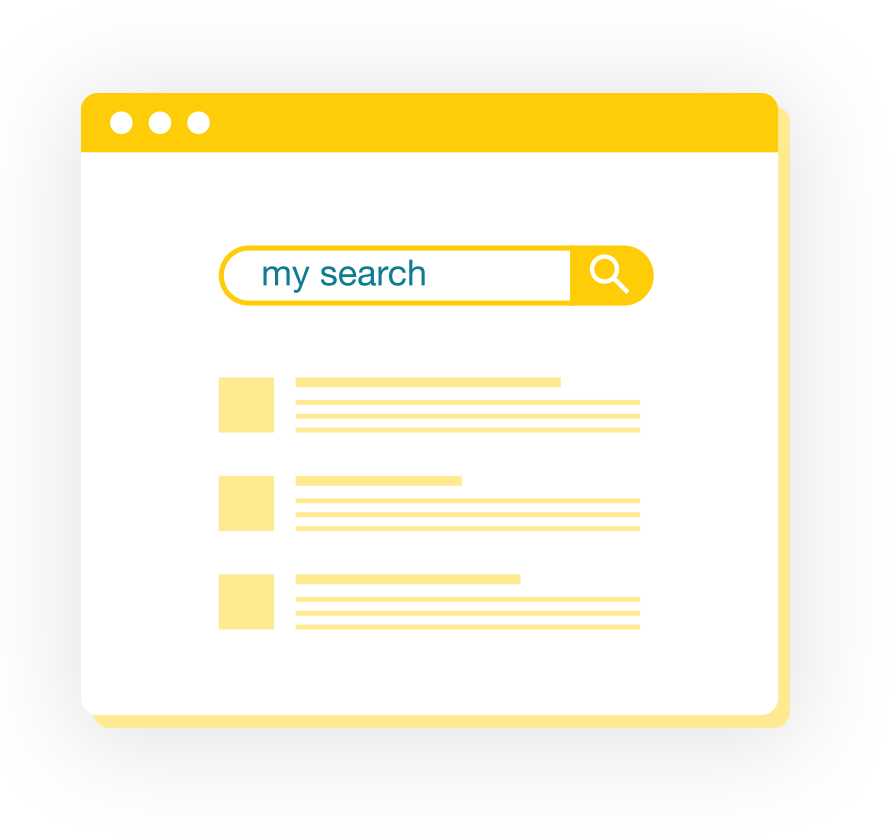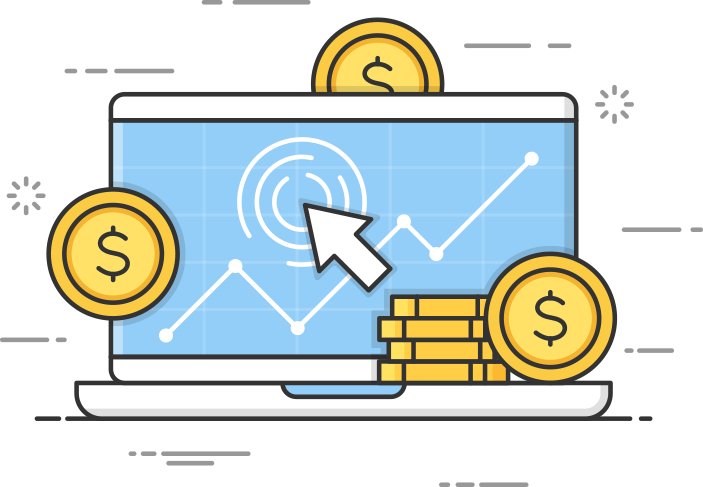Grow Your Business with
Our PPC Services
Let us take care of your PPC campaigns for fast and favorable results!

Grow Your Business with
Our PPC Services
Let us take care of your PPC campaigns for fast and favorable results!


What Is
Pay-per-click (PPC) is an internet advertising model that targets customers with fast and immediate results. It is an effective, efficient, and scalable digital marketing method that can grow your business.
PPC is a different approach compared to organic rankings. The goal of every marketer is to rank high in a search engine’s results page (SERP), but this is easier said than done. Ranking in the top spot entails a lot of work, so it helps to have extensive knowledge of how Google ranks a website. There is also a risk that even if you reach the number one position, you may still lose it when Google inevitably releases another algorithm update that changes the game or when your competitor outperforms you.
If you don’t have the time and resources to get your content or website appear on the first page of SERPs, there is one avenue you can consider: pay-per-click advertising. Through PPC, not only will you be listed on top of SERPs, but you can also gain invaluable insights on the users who visit your website.
With PPC, advertisers pay a fee every time one of their ads is clicked by a user. To put it simply, it’s a way of buying visits to your website, instead of “earning” those visits organically.
Essentially, it works by having a set budget for your ads on a specific platform, such as Facebook or Google, then you pay a certain amount when a user clicks on your ad.
PPC ads can be particularly useful for specialized and time-sensitive campaigns such as events and promotions to go against your competitors, retarget users who have visited your site, or hyperfocus your efforts on localized markets in your niche.
Keep in mind that PPC isn’t advisable to be used alone if it’s your only interaction with online users. It should be utilized in conjunction with your traditional SEO and digital marketing methods to help boost the amount of qualified traffic to your site.
With PPC, advertisers pay a fee every time one of their ads is clicked on by a user.
It’s a way of buying visits to your website, instead of “earning” those visits organically. Essentially, it works by having a set budget for your ads on a specific platform, such as Facebook or Google, then you pay a certain amount when a user clicks on your ad.

Our Pay Per Click Services
You get what you pay for in pay-per-click advertising. Since it involves paying for placement on search engines, it is commonly referred to as search engine marketing (SEM). Clicks can be costly and they don’t guarantee success. To achieve your goals, a successful pay-per-click campaign needs to have the following elements:
You get what you pay for in pay-per-click advertising. Since it involves paying for placement on search engines, it is commonly referred to as search engine marketing (SEM). Clicks can be costly and they don’t guarantee success. To achieve your goals, a successful pay-per-click campaign needs to have the following elements:
After selecting the right keywords for your PPC ad campaign, you can bid on them. The general rule is the higher the bid, the higher your PPC ad will rank. However, competition for keywords can be fierce, so bid high as your budget can allow and make the necessary adjustments as you see that your strategy reaps good results.
Compelling copy can be vital in keeping your pay-per-click advertising budget on track. Whenever your copy properly addresses a targeted audience, it will likely result in a decrease in the quantity of clicks but an increase in quality. This means that the cost of clicks will go down while conversions by more qualified visitors will go up.
While keywords and compelling copy may lead visitors to your website, PPC landing pages are designed to make them convert. When they arrive at a landing page that supports the content of your PPC ad, consumer confidence—both in your product or service and your brand—would soar. A customized PPC landing page gives customers what they need without the fuss of going through your home page. In most cases, this kind of enhanced user experience leads to increased conversions and return on investment for your PPC marketing campaign.
Your PPC ad campaigns should be managed regularly to make sure they continue to be effective. In fact, consistent account activity is one of the best indicators of a campaign’s success. Its performance should continuously be analyzed and adjusted to maximize your campaigns.
Benefits of Pay Per Click
Just like organic search, you can target a specific audience through keywords in PPC. But as an advertiser, you’ll have more advanced forms of targeting options available to you. You can have your ad cover various locations using hundreds of keywords at a time. You can also fine-tune this to reach people by their online behaviors and interests. PPC advertising offers better targeting precision than organic search and traditional methods of advertising.
When setting an advertising budget in PPC, the ball is in your court. It’s up to you if you want to increase or decrease your budget, giving you complete control of your ad campaign. If you see positive results, you can immediately scale up. And if you want to stop due to budget concerns, you can pause your campaign right away. This way, you can have the flexibility to make quick adjustments and optimize the ads that you’re currently running. You can even try new things and experiment with new strategies. It’s all about striking the right balance between your ad spend and the reach you wish to cover.
Content marketing is the driving force of the digital marketing industry, and content plans are now a staple in the calendars of businesses. PPC is an engine that can drive visitors to your content more quickly and improve the return on investment of your campaigns. It works well with SEO as the performance data from your PPC campaigns provide excellent insight and direction for a keyword.
Since stats are readily available for you to measure the performance of your campaigns, you’ll also be able to track the results of your strategies in terms of budget and target data entries. This will help you determine if you’ve achieved your marketing goals.
The beauty of a PPC ad campaign lies in its measurability, so you can easily track your returns on advertising spend. You can determine which ads, keywords, or ad placements are giving you the most returns. A tracker can also be installed to keep tabs on the number of conversions you are getting. These metrics can help you make educated decisions in managing future PPC ad campaigns.

Jimmy and his team took over our AdWords account recently, and within 3 months have been able to increase revenue by 6.4x on the same spend compared to the previous agency
Curious about how PPC actually affects your business? Here are a few statistics to convince you to consider it, if you haven’t already.
• 7 million advertisers spent $10.1 billion for PPC ads in 2017. (SocialMediaToday)
• The US retail industry spent $23.5 billion on digital advertising in 2018. (EMarketer, Marketing Charts)
• 51% of marketing and advertising budgets are being put into mobile ads. (Impact)
• Businesses usually earn $2 for every $1 spent on Google Ads. (Google Economic Impact, WordStream)
• 17% of marketers use PPC for lead generation. (Formstack)
• Display ads can increase website traffic by 300%. (Visually)
• Paid search ads can increase brand awareness by 80%. (Google Ads)
• The top 3 paid ads get 41% of clicks. (WordStream)
• A paid ad at the top position on the first page of Google has a CTR of 7.11%. (AccuraCast)
• Google Ads with high commercial intent get 65% of clicks. (WordStream)
• Google Ads has a higher average CTR than Bing Ads. (WordStream)
• However, Bing has higher conversion and CTR. (Spinutech)
• 65% of B2B companies have acquired a customer through LinkedIn paid ads. (HubSpot)
• Google and Facebook account for 60% of all ad spend, getting 38.2% and 21.8% of shares, respectively. (EMarketer)
• The most expensive AdWord is “insurance” at $54.91, while “gas/electricity” costs $54.62. (WordStream)
• 75% of users click on ads to easily find the information they need. (Clutch)
• 49% are likely to click on a text ad, but the preference depends on the website they are using. (Clutch)
• 25–34 year-olds are more likely to ignore online ads than they would traditional TV, radio, and newspaper ads. (Blue Corona)
• 54% of users don’t click banner ads because they don’t find it trustworthy. (BannerSnack)
• Social and mobile gaming video ads have a 91% viewing completion rate. (CMO)
• Consumers are 27 times more likely to click on online video ads than standard banners. (CMO)
• 60% click on mobile ads at least weekly. (Business Wire)
• PPC visitors are 50% more likely to purchase than organic visitors. (WordLead)

In order to provide quality service for clients, PPC Specialists must be adept in using
different tools that will make campaign management a breeze.

Google Ads Editor is one of the easiest and most cost-efficient tools in managing client PPC campaigns. It boasts ad creation and editing features that allow bulk changes—for instance, updating keyword bids for optimization—that are especially useful when working on large campaigns or campaigns encompassing multiple Google Ads accounts. This works both online and offline.
Google Keyword Planner is touted as one of the original keyword research tools. Even though more and more marketers are opting to use other tools to find relevant keywords, especially for specific countries, Google’s tool remains helpful and free to use.
With Keyword Planner, you can build your keyword list by entering your target keyword and waiting for it to generate new keywords that you can use for your upcoming campaigns. The list can be arranged by volume, competition, or relevancy, depending on which information is most useful for you. This can help you plan, get the right keywords at the best price, or create ad groups before starting your campaign.
One of the reasons why many marketers forego Google Keyword Planner before was the removal of the number of monthly searches for keywords on the tool. However, this can easily be remedied by using a handy browser plugin that will bring back this information if you do find it essential.
SEMrush is a great, inexpensive alternative because it also has familiar features. While it is greatly helpful in SEO, website audits, rank tracking, and social media monitoring, it’s also useful in improving your PPC campaigns, thanks to its ability to find profitable keywords in different niches and provide competitive research data, as well as domain data.

This would all depend on the platform you choose. Google Ads will show your PPC ads on their SERPs and partner sites or publishers that participate in Google ads via the AdSense program. Bing Ads, meanwhile, not only shows theirs next to the Bing search results page, but also on other web properties owned by Yahoo and Microsoft, including MSN.
Again, it depends on the kind of PPC ad you have. Search advertising PPC ads are displayed when a user goes to a search engine to look up something. When he uses a keyword that is relevant to your business, your ads will show up above the organic results on SERPs. These ads are considered highly targeted as only those who are already interested in your product or service will see it.
Meanwhile, display PPC ads are shown on websites, blogs, and landing pages that are part of an ad publishing program like Google AdSense. Naturally, these ads aren’t as focused because they may be shown to anyone who is on the page.
Simply put, PPC ads are one of the most effective methods in digital marketing. It can help you find new customers or make your brand known to your target audience. PPC is scalable, flexible, and engaging.
It can outperform other disciplines like SEO and content marketing because PPC delivers quick results. Thanks to various tools and platforms, the success of your PPC campaigns can easily be measured and analyzed, depending on your key metrics. You just don’t get to enjoy such perks with other marketing methods.
The cost of your PPC ad campaign would depend on a number of factors, so it’s safe to say that there is no specific figure for the cost. It also helps that the different ad platforms offer varying bids for each keyword, so you can base your budget on the keyword you are planning to get.
Needless to say, bidding is one of the factors that may change-up your PPC campaign budget and overall cost. In industries where there is high competition, bids for highly-coveted keywords may cost $50 or more for a single click. Of course, you may still get quite a number of visitors for a bid less than $1.
Your ad’s quality score can also come into play. A high-quality score may get your ad a spot on the SERPs even with a low bid, but a low-quality score may need a high bid, increasing the cost of your PPC campaign.
You do share prospects with your competitors, so they bid on your business name to try and steal the customers away from you. There are no rules against this, and is actually a cost-effective means of reaching prospects that you may consider.
So, should you bid on your own brand name? You decide. This can be a way for you to take up as much real estate as possible, and to ensure that searchers will find you, instead of your competition. These branded clicks are generally inexpensive anyway.

When setting up your campaign, you’ll likely encounter different types of keyword match, but one you should be wary of is the broad match. By using broad match keywords, you are giving Google too much control when matching your ads to a search term.
This can result in irrelevant traffic that can increase bounce rates because users will realize that your site isn’t really what they’re looking for. In addition, this will cost you money and bring down conversion rates. Instead, use exact match keywords that are highly relevant to your business, then phrase or broad match to discover other relevant searches.
As mentioned, PPC may come in the form of search or display ad, though it’s worth noting that having both types in the same campaign is not good practice. This would make your campaigns very difficult to manage for different reasons.
Search ads are highly targeted, resulting in high CTRs and CPC; whereas display caters to a broad audience, giving it lower CTRs and CPC. With such differences, having both types of PPC ads can skew your data, as well as the campaign as a whole.


Always test new ideas to discover whether different ads can get you better results. Create at least 3 ads per ad group, and then have just one variable like changing the headline or description.
Make sure that your ad rotation is set to “Do not optimise: Rotate ads evenly” so that each will get a fair chance to be shown. Setting it to “Optimize: Prefer best performing ads” will make Google choose what it thinks is the best performing ad and show that more often.
Let these ads run for 30 days then compare their results. Only then will you find the fairest results for a more accurate judgment of performance.
Each of your campaigns deserves its own landing page for a better chance of conversion or lead generation. It also makes performance measurement and optimization easier.
The landing page should be highly relevant to your ad and keyword. Moreover, it should be easy to navigate, provide informative content, and have a CTA that can maximize conversions. You’d want a highly relevant landing page so that Google can give your ad a high quality score.

